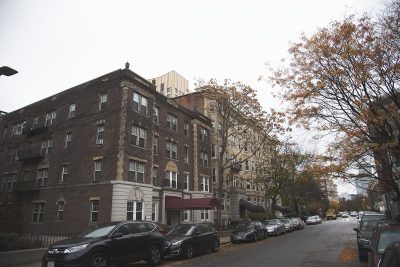The Boston real estate market has seen a significant decline in rentals since the pandemic began.

As many college students choose to learn remotely, thousands of rental units in Boston remain vacant.
These vacancies now total 13,000, said Ted Landsmark, director of the Dukakis Center for Urban Research and Policy. The absence of students this fall, he said, will significantly impact housing markets and communities dependent on students.
“There are vacancies in rental housing that are the result of students not returning to their campuses, and those vacancies are affecting every one of the six New England states,” Landsmark said. “They are felt most severely in smaller New England communities where the college may be a major employer and a major provider of tenants in local housing.”
With its typical large population swing as students move to their campuses, Landsmark said, Boston’s vacancies are now more obvious. The effects of COVID-19, he said, could continue to harm the Boston rental market.
“The long term effects on the housing market could prove to be similar to the coronavirus effects on retail,” Landsmark said, “which have led to substantial bankruptcies of major retailers and restaurant chains across the United States.”
Some rents have declined by as much as 10 percent, Landsmark said, adding that landlords may face foreclosure if they do not find tenants.
“There’s a tendency to assume that all landlords are rich and are sitting on large reserves of capital that enable them to survive vacancies,” Landsmark said. “But that’s simply not the case.”
Rental units overtaken by banks will not reappear on the market until the building is auctioned off or sold privately, Landsmark said. These units may be seen primarily in neighborhoods near colleges.
“Areas that are adjacent to campuses are most impacted,” Landsmark said, “but also areas that are close to public transportation that enable students to live at a greater distance and pay somewhat lower rents.”
How long landlords will have to wait until more students return to Boston, which is dependent on the state of the coronavirus, determines when the market could begin to recover.
“If a vaccine were to be developed and widely distributed in January or February, that would not have a substantial positive effect on the Boston real estate market until September of 2021,” Landsmark said. “Given what we now know about the coronavirus, we may not see a substantial return of students for the spring semester, and it may take two to three years for the market to return to the same level it has been at for the past decade.”
Andrew Sobel, vice president of the Compass real estate agency, said that despite new incentives offered by landlords and brokers, he expects some rental prices to stay the same on paper.
“They want to keep their rent prices high for the books, so that their $4,000-a-month apartment still rents as $4,000 a month,” Sobel said. “But, they’re willing to offer one, two months free, as well as paying a broker fee to get people in.”
This quantity of rental units currently available has not been seen in the past decade, according to Sobel, who added that rentals were “pretty competitive” around five years ago.
Landlords whose incomes have become destabilized due to a lack of tenants may consider selling their properties or lowering rents, Sobel said.
“Landlords, whether they’ve owned [properties] a couple years or 20 years, might say, ‘Hey, now’s the time to cash out,’” Sobel said. “The sales market is still very strong, and that could result in quite a few of these rental-style properties coming to market as sales listings over the next couple of months.”
However, Sobel said landlords should think about the long term when weighing exit strategies.
“Getting so focused on a single year can be a little bit of a trap,” Sobel said. “What’s the bigger picture of your investment? You have to look at it in that way: people are going to come back to the city. That’s inevitable.”
























































































































